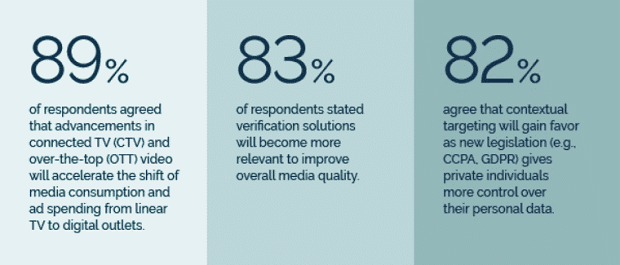
The report highlights the key trends, technologies, and challenges media professionals across Western Europe expect to drive change in digital advertising this year.
Key findings:
- Advertising: Context-centric ads predicted to be the biggest media trend of 2020
- Programmatic advertising: Targeting the right audience cited as the top programmatic advertising challenge
- Mobile: Respondents believe mobile will be the dominant force in 2020
- Social media: Lack of transparency may negatively affect the UK’s 2020 social media spend
- Data privacy: The top digital media challenge is expected to be continuing data privacy legislation
Mobile set to dominate digital campaigns
The report reveals mobile will be the dominant media force in 2020, cited by 87% of respondents as their number one priority for 2020. Closely followed by digital video at 86%, this shift highlights industry efforts to align with changing consumer habits and the growing appetite for on-the-go, short-form content.
The study findings, however, show two-fifths (40%) of media professionals consider mobile in-app display and video formats among the most vulnerable to fraudulent activity.
Overcoming digital media hurdles
Data privacy was named as the primary media challenge of 2020 by over two-fifths (44%) of respondents, along with more than eight in ten (82%) predicting context-centric ads will be the biggest media trend of 2020.
Concern around the difficulties of assessing campaign return on investment (ROI) is reflected in a determination to leverage tactics and solutions that directly address the need for precise insight into advertising performance: 61% of media professionals plan to implement campaign ROI evaluation tools, while 59% intend to apply viewability measurement.
Programmatic priorities are shifting
Over half (52%) of respondents cite targeting the right audience as their top programmatic advertising challenge, with inability to reach desired performance goals coming in second (45%). Previously a top concern for automated advertising, anxiety around viewability and brand safety has reduced with the report showing those factors are now listed as challenges by only one-third (34% and 32% respectively) of media professionals.
Social media retains an irresistible draw
Just under three-quarters (73%) of media professionals feel social platforms could provide greater clarity around brand risk levels and almost two-thirds (63%) want more openness into viewability measurement. Despite continued conversations around transparency, this anxiety hasn’t reduced desire to invest in social media and it remains a vital element of digital campaigns. In fact, concern has significantly fallen over the last year, with only 35% of UK-specific respondents stating that a lack of transparency will negatively affect 2020 social media spend, in contrast to 70% in the 2019 IAS Industry Pulse Report.
The on-going fraud evolution
When considering online ad fraud, more than half (55%) of respondents believe their ad campaigns experience lower levels of fraud than the average global rate for desktop display fraud, at 11.7%. Although knowledge of common types of ad fraud, such as bots, falsely represented sites, and malware, is high, with over 70% of respondents claiming familiarity, the wider ad fraud toolkit is less well recognised. In the year ahead, addressing low familiarity with risks such as invalid proxy traffic (54%), hijacked ad tags (49%), and cookie stuffing (49%) will be essential.
“It’s encouraging to see that digital media professionals are taking an enthusiastic yet balanced approach to industry innovation as we enter this decade,” commented Nick Morley, EMEA MD at IAS. “While excited to extend their efforts with mobile and video, and push new boundaries in contextual advertising, advertisers across Europe are keeping an eye on the need for robust fraud protection and technology that offers maximum clarity into campaign performance. In the year ahead, it will be critical to maintain this even-handed view and ensure both media quality, and campaign effectiveness, remain front and centre.”
IAS surveyed 94 professionals in three core European markets — the UK, France, and Germany — to discover how industry professionals perceived transparency and innovation in 2019, and the resulting impact it will have on their budgets, and focus, in 2020.
Source: integralads.com
